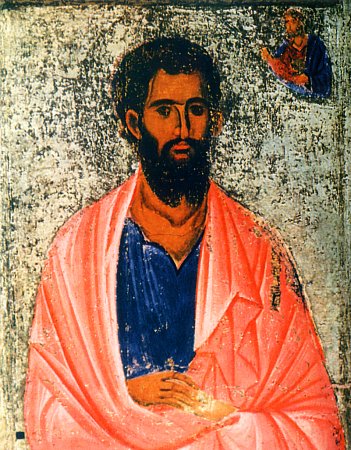James, the Brother of the Lord, apostle of the Seventy
Dates of commemoration
(Church calendar - Dec 26) Movable feast - Sunday after the Nativity of our Lord God and Savior Jesus Christ, holy ancestors
Life
Saint James the Just, also called James Adelphos and James the Brother of Our Lord (died AD 62), was the first Bishop or Patriarch of Jerusalem. According to the Protoevangelion of James, James was the son of Joseph—along with the other 'brethren of the Lord' mentioned in the scripture—from a marriage prior to his betrothal to Mary. He wrote an epistle which is part of the New Testament. St. James is commemorated on October 23; on December 26 and also on the first Sunday after the Nativity, along with David the King and St. Joseph; and on January 4 among the Seventy Apostles.
Jerome, De Viris Illustribus, quotes Hegesippus' account of James from the fifth book of his lost Commentaries:
- "After the apostles, James the brother of the Lord surnamed the Just was made head of the Church at Jerusalem. Many indeed are called James. This one was holy from his mother's womb. He drank neither wine nor strong drink, ate no flesh, never shaved or anointed himself with ointment or bathed. He alone had the privilege of entering the Holy of Holies, since indeed he did not use woolen vestments but linen and went alone into the temple and prayed in behalf of the people, insomuch that his knees were reputed to have acquired the hardness of camels' knees."
Paul further describes James as being one of the persons the risen Christ showed himself to (I Corinthians 15:3-8); then later in I Corinthians, mentions James in a way that suggests James had been married (9:5); and in Galatians, Paul lists James with Cephas (better known as Peter) and John, as the three "pillars" of the Church, and who will minister to "the circumcised" (that is the Jews) in Jerusalem, while Paul and his fellows will minister to the Gentiles (2:9, 2:12).
Acts provides clear evidence that James was an important figure in the Christian community of Jerusalem. When Peter, having miraculously escaped from prison, must flee Jerusalem, he asks that James be informed (12:17). When the Christians of Antioch are concerned over whether Gentile Christians need be circumcised to be saved, they send Paul and Barnabas to confer with the church there, and it is James who utters the definitive judgment (15:13ff). When Paul arrives in Jerusalem to deliver the money he raised for the faithful there, it is James to whom he speaks, and who insists that Paul ritually cleanse himself (21:18).
A debated passage, often characterized as a Christian interpolation, in Josephus' Jewish Antiquities, records his death in Jerusalem as having occurred after the death of the procurator Porcius Festus, yet before Clodius Albinus took office (Antiquities 20,9)—which has thus been dated to AD 62. The high priest Ananus took advantage of this lack of imperial oversight to assemble a council of judges who condemned James "on the charge of breaking the law," then had him executed by stoning. Josephus reports that Ananus' act was widely viewed as little more than judicial murder, and offended a number of "those who were considered the most fair-minded people in the City, and strict in their observance of the Law," who went as far as meeting Albinus as he entered the province to petition him about the matter. Their agitations led to Ananus being deposed as high priest.
Eusebius, while quoting Josephus' account, also records otherwise lost passages from Hegesippus (see links below), and Clement of Alexandria (Historia Ecclesiae, 2.23). Hegesippus' account apparently varied from what Josephus reports: the Pharisees, upset at St. James' teachings, first threw him from the summit of the Temple in Jerusalem, then stoned him, and at last broke his skull with a fuller's club.
The Protevangelion of James (or Infancy Gospel of James), a work of the 2nd century, also presents itself as written by James.
Source:
Holy relic type
unless specified otherwise below, "holy relic" means a fragment of a bone of the saint
1. Holy relic
2. Holy relic
Location of the holy relic in the Cathedral:
1. Icon of the Synaxis of the Apostles, east wall of the Cathedral, in front of the north kliros
2. Icon of Apostle James, wall along the staircase to the choir balcony
Troparion
Tone 4
As the Lord's disciple you received the Gospel, O righteous James; As a martyr you have unfailing courage; As God's brother, you have boldness; As a hierarch, you have the power to intercede. Pray to Christ God that our souls may be saved.
Kontakion
Tone 4
When God the Word, the Only-begotten of the Father, Came to live among us in these last days, He declared you, venerable James, to be the first shepherd and teacher of Jerusalem And a faithful steward of the spiritual Mysteries. Therefore, we all honor you, O Apostle.






